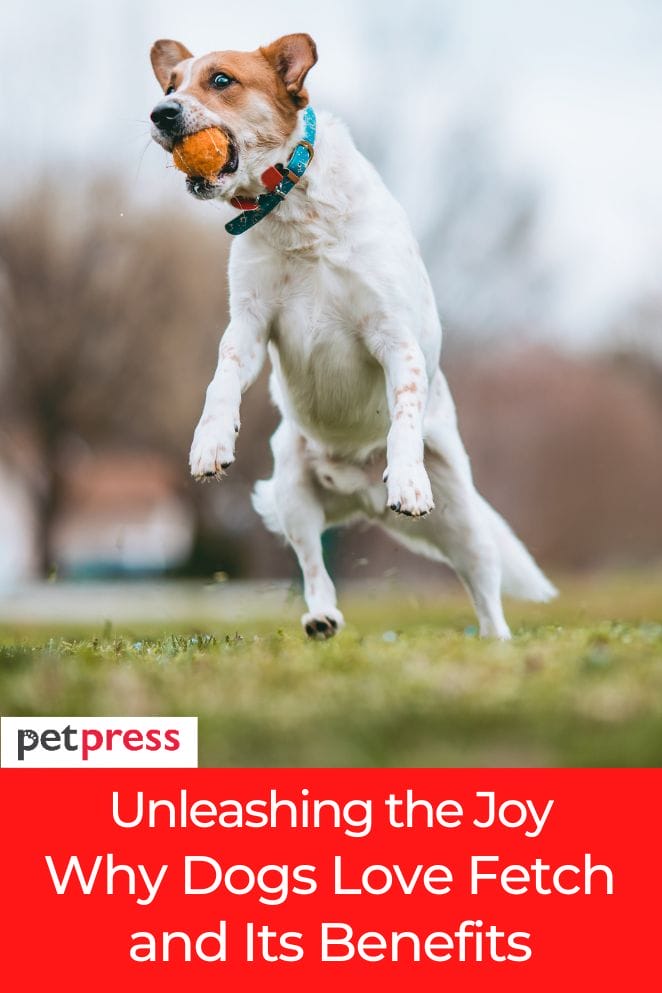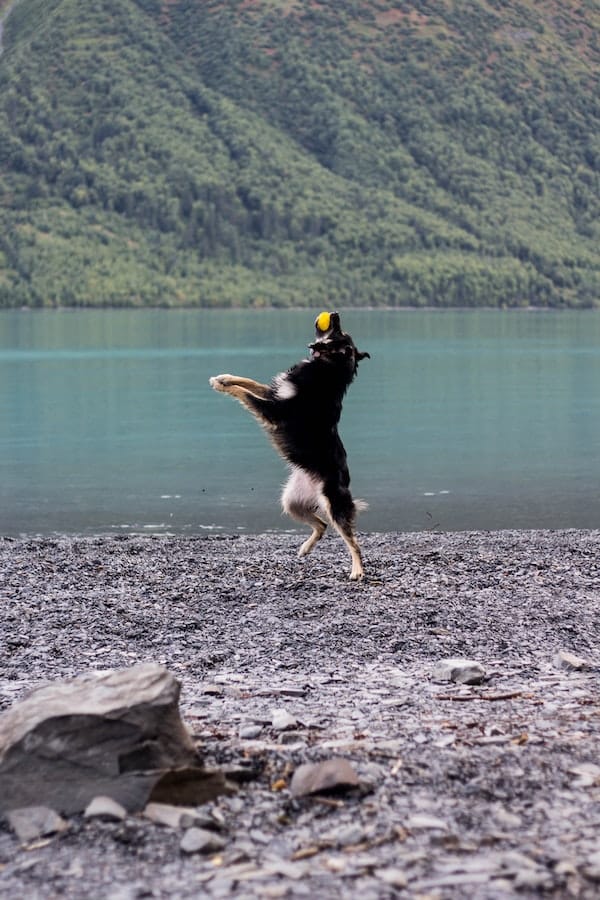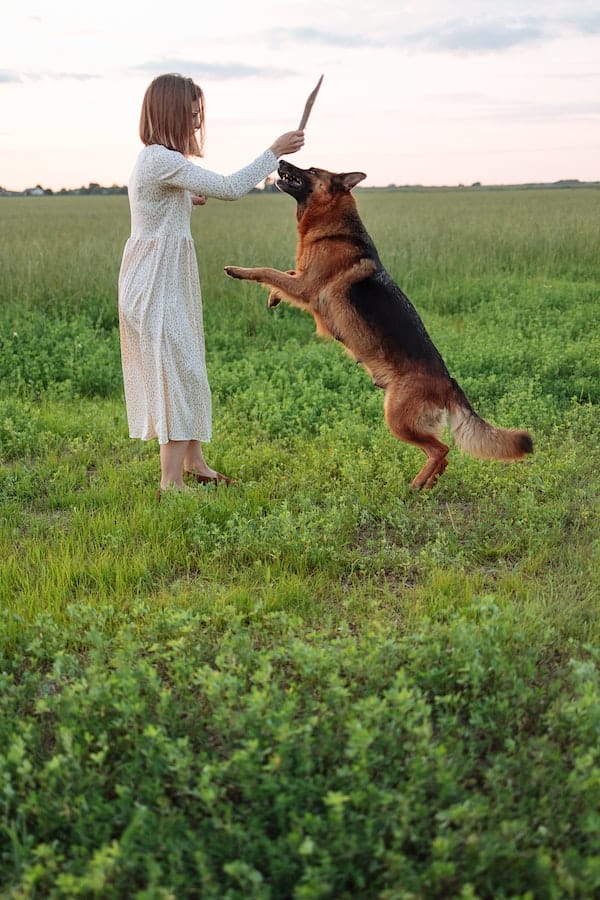
Imagine a sunny day at the park, with your furry friend eagerly waiting for you to throw their favorite toy.
The moment you launch it into the air, they sprint after it with unbridled enthusiasm, returning it to you with a wagging tail.
This simple act of playing fetch is more than just a game for dogs; it’s an instinctual behavior deeply rooted in their nature.
In this article, we will explore why dogs love fetch and delve into the many benefits of this beloved pastime.
Why Do Dogs Love Fetch?

Have you ever wondered why your canine companion is so obsessed with fetch?
It all goes back to their evolutionary history.
Dogs are descendants of wolves, and their ancestors were skilled hunters.
The act of chasing and retrieving objects mimics the hunting behavior that is hardwired into their DNA.
Instinctual drive
The game of fetch taps into a dog’s primal instincts, invoking their innate predatory drive.
This urge to chase is deeply rooted in their evolutionary history as hunters and trackers.
It harks back to the days when their wild ancestors relied on these instincts to secure their next meal.
In the modern world, where their food is readily available, fetch becomes an opportunity for dogs to exercise and refine these hunting skills, allowing them to connect with their primal nature and satisfy a fundamental aspect of their identity.
Physical exercise
Playing fetch is a fantastic way for dogs to let loose and burn off their abundant energy.
It involves a lot of running and jumping, which is crucial for their general health and overall wellness.
Just like we humans need to exercise regularly to stay in shape, dogs also require physical activity to maintain a healthy weight, build strong muscles, and ensure their hearts stay in good condition.
Incorporating fetch into their routine not only helps in preventing issues like obesity but also adds to the joy and longevity of your furry companion’s life.
Mental stimulation
Fetch is not just about physical exertion; it provides dogs with valuable mental stimulation.
As they watch and chase the flying object, they engage their cognitive abilities to calculate its trajectory, anticipate its movements, and track its path with focus.
This mental engagement is akin to problem-solving or strategic thinking for humans.
Dogs use their cognitive skills to decipher the physics of the object’s flight, which gives them a sense of accomplishment when they successfully catch or locate it.
Benefits of Dogs Playing Fetch

Now that we’ve explored why dogs have an inherent love for fetch, let’s dive into the numerous benefits this activity offers to our four-legged companions:
Physical fitness
Regular games of fetch are a powerhouse of physical benefits for your canine companion.
This simple yet engaging activity helps your dog maintain an excellent level of physical fitness.
It acts as a natural fitness regimen, assisting in the management of their weight, enhancing muscle tone, and ensuring their cardiovascular system remains in tip-top condition.
Each sprint and jump during a game of fetch contributes to a symphony of physical prowess, promoting the overall health and well-being of your furry friend.
Mental agility
Yet, fetch is more than just a physical pastime. It’s a mental workout for our furry friends too.
Amidst all the chasing and retrieving, our dogs’ minds are actively engaged.
They’re refining their ability to solve problems, enhancing their concentration, and keeping their mental abilities in top form.
It’s akin to a mental gymnastics routine, ensuring that their intellect remains as sharp as their physical prowess, ultimately leading to a well-rounded and contented life.
Bonding
The act of playing fetch with your dog is not just a form of exercise but also a beautiful bonding experience.
It’s a shared adventure that forges a strong emotional connection between you and your furry friend.
The simple joy of tossing a ball and having your dog eagerly retrieve it creates moments of trust, camaraderie, and pure happiness.
These shared moments strengthen the bond between you two, enriching your relationship and fostering a deeper understanding of each other.
Stress relief
Just like humans, dogs can experience stress and anxiety.
The good news is that fetch can be a powerful stress-relief tool for your pet.
The physical activity involved in the game releases endorphins, those natural mood-enhancing chemicals.
As your dog chases and retrieves the object, their stress and anxiety levels are reduced, replaced by a sense of joy and accomplishment.
It’s a therapeutic escape from the demands of daily life, leaving your dog more relaxed and content.
So, next time you reach for that ball or stick, you’re not just playing a game; you’re investing in your dog’s physical and mental well-being while nurturing your special bond.
Conclusion
Dogs’ adoration for a good game of fetch is ingrained in their very DNA.
It not only caters to their natural instincts but also offers a host of physical and mental perks.
As loving and responsible pet parents, including regular rounds of fetch in our beloved four-legged companions’ daily lives, is a delightful means to guarantee their holistic health and happiness.
FAQs
Absolutely! Most dogs, regardless of breed or size, can enjoy a game of fetch. It’s all about finding the right object and pace that suits your dog’s abilities.
Teaching fetch is relatively simple. Start with a soft toy or ball, throw it a short distance, and encourage your dog to retrieve it. Reward them with praise and treats when they bring it back.
Fetch can be adapted for senior dogs. Use softer toys and throw the objects shorter distances to avoid overexertion. Always consult your vet for specific recommendations based on your dog’s age and health.
- Does Cat Litter Melt Ice? The Complete Guide to Winter Safety - January 30, 2026
- Happy Tail Dogs: Understanding This Common Canine Condition - January 29, 2026
- How Cold Can Outdoor Cats Handle? Feline Winter Safety - January 27, 2026


GIPHY App Key not set. Please check settings